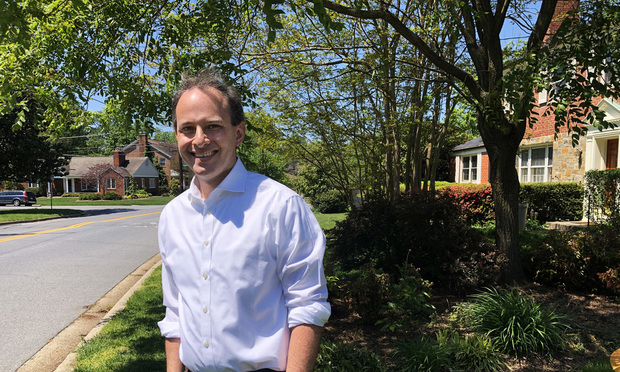Munger Tolles Nabs Jonathan Kravis, Prosecutor Who Opposed Barr in Stone Case
For Kravis, the move to Munger Tolles, where he will be a partner in Washington, marks a return to private practice following a career spent largely as a prosecutor.
June 22, 2020 at 10:30 AM
7 minute read
The original version of this story was published on National Law Journal
 Jonathan Kravis. Credit: Diego M. Radzinschi / ALM
Jonathan Kravis. Credit: Diego M. Radzinschi / ALM
Updated 1:32 p.m.
Jonathan Kravis, a former federal prosecutor who resigned in protest of the Justice Department leadership's intervention in the sentencing of Roger Stone, has joined Munger, Tolles & Olson as a partner in Washington, the law firm said Monday.
In February, Kravis stepped down as a leader of the federal prosecutor's office in Washington after seeing his sentencing recommendation for Stone, a longtime friend and adviser of President Donald Trump, overruled by U.S. Attorney General William Barr. The three other career prosecutors who had helped secure Stone's conviction withdrew from the case but have remained at the U.S. Justice Department.
One of those prosecutors, Aaron Zelinsky, an assistant U.S. attorney in Maryland, is expected to testify Wednesday at the House Judiciary Committee about Barr's leadership of the Justice Department. That leadership is now under fire more than ever, as Barr played a central role in the ouster of the U.S. attorney in Manhattan, Geoffrey Berman, whose office had been leading various probes of figures in Trump's orbit.
In recent months, after leaving the U.S. Attorney's Office, Kravis has advised the District of Columbia's attorney general, Karl Racine, on building a public corruption unit within that office to pursue bribery, fraud and campaign violations in the nation's capital. Kravis delivered his recommendations to Racine last week, laying out what he viewed as the office's existing authority to prosecute public corruption while also pointing to legislative reforms that could strengthen its enforcement powers.
For Kravis, the move to Munger Tolles marks a return to private practice following a career spent largely as a prosecutor.
A former clerk for Justice Stephen Breyer, Kravis worked as an associate at Williams & Connolly before joining the U.S. Attorney's Office in Washington late in the George W. Bush administration. Kravis left in 2009 to spend a year in the Obama White House's counsel's office headed by Gregory Craig, a former Williams & Connolly partner.
"Working in public service is one of the highest callings, and I'm honored to have spent more than a decade at the U.S. Department of Justice and in the White House," Kravis said in a statement released by the firm. "But I've always known that I also wanted to work in a law firm, and Munger, Tolles & Olson's reputation is unparalleled."
Kravis joins a Munger Tolles office headed by Donald Verrilli Jr., who defended the Affordable Care Act before the U.S. Supreme Court as solicitor general under the Obama administration. In an interview Monday, Verrilli told The National Law Journal that he contacted Kravis shortly after he stepped down as a prosecutor. His message to Kravis: If he was considering private practice, "we would love to have a chance to talk to him."
Verrilli said the firm was drawn to Kravis based on his "extraordinary record as a trial lawyer," along with his "character and integrity." Also, he said, Kravis has a "track record as mentor to younger lawyers."
 Former U.S. Solicitor General Donald Verrilli Jr., now at Munger Tolles, in his then-office at the U.S. Department of Justice. Credit: Diego M. Radzinschi / NLJ
Former U.S. Solicitor General Donald Verrilli Jr., now at Munger Tolles, in his then-office at the U.S. Department of Justice. Credit: Diego M. Radzinschi / NLJ"That's really really important to us. We have a group of extremely talented young lawyers at Munger Tolles. They're hungry to learn how to be a great trial lawyer, and Jonathan can teach them."
"We think he'll be exactly the kind of lawyer we aspire to be at Munger, Tolles & Olson and, frankly, that every lawyer should aspire to be," Verrilli said.
Verrilli declined to address the recent turmoil at the Justice Department, saying he wanted to "stay focused" on Kravis joining the firm.
After returning to the U.S. Attorney's Office in Washington, Kravis prosecuted homicide cases before joining the public integrity section of the Justice Department's criminal division. His tenure at so-called Main Justice was highlighted by the conviction of former U.S. Rep. Chaka Fattah, a Democrat from Philadelphia who was found guilty of bribery, money laundering and other charges related to his misuse of campaign funds. Fattah resigned in 2016 following his conviction and is now serving a 10-year prison sentence.
Early in the Trump administration, Kravis returned to the federal prosecutor's office in Washington to become deputy chief of the fraud and public corruption unit. In that role, Kravis handled cases the U.S. Attorney's Office inherited from former Special Counsel Robert Mueller's investigation, including the prosecution of Stone and a separate case against Russian individuals and companies accused of interfering in the 2016 presidential election.
Kravis and other prosecutors had recommended that Stone receive a sentence of between seven and nine years in prison. But, after Trump publicly criticized the recommendation as a "miscarriage of justice," Barr stepped in to suggest a more lenient punishment for the longtime Trump ally. Stone was ultimately sentenced to more than three years in prison.
"The department undercut the work of career employees to protect an ally of the president, an abdication of the commitment to equal justice under the law," Kravis said in a Washington Post op-ed in May.
Barr's conduct in the Stone prosecution became a flash point, raising broader questions about the independence of the U.S. Justice Department.
In the months since, those questions have only intensified as the Justice Department has moved to drop the prosecution of former national security adviser Michael Flynn. More recently, Barr has drawn outcry over pushing out Berman, the leader of the federal prosecutor's office in Manhattan.
In an announcement late Friday, the Justice Department said Berman had stepped down and would be replaced on an acting basis by Craig Carpenito, the top federal prosecutor in New Jersey. Berman quickly issued a rebuke, saying he had not, in fact, stepped down and would not do so until a successor was confirmed.
Barr has not given any public reasoning why he and Trump moved to fire Berman, a former Greenberg Traurig partner who had been serving by appointment of a panel of federal judges in New York.
Berman ultimately agreed to step down after Barr said the president had decided to fire him and that the second-in-charge of the Manhattan federal prosecutor's office, Audrey Strauss, would take over on an acting basis. Trump plans to nominate Jay Clayton, the chairman of the U.S. Securities and Exchange Commission, to serve as the next U.S. attorney for the Southern District of New York.
"There has always been a tension—much of it healthy—between Washington and the Southern District, but the attempt to fire the current United States attorney feels very different," wrote former FBI Director James Comey in the Washington Post. "Geoffrey Berman's office has apparently been handling cases very close to the president. In 136 days, there is an election that the incumbent appears likely to lose. The attorney general, surely not proceeding on his own, acts to bump the well-regarded head of the Office on a Friday night, in the middle of a pandemic. Something stinks."
Read more:
Ex-Stone Prosecutor Kravis' Advice: 'Stay True to the Principles That Led You to Serve'
'A Loss to the Pursuit of Justice': Praise for Roger Stone Prosecutor Who Resigned
'When Character Matters Most': What Lawyers Said About Stone Prosecutors
'A Very Difficult Time': Challenges for Career Lawyers at Trump's DOJ
'Slammed': What Has Driven Departures From Trump's Justice Department
This content has been archived. It is available through our partners, LexisNexis® and Bloomberg Law.
To view this content, please continue to their sites.
Not a Lexis Subscriber?
Subscribe Now
Not a Bloomberg Law Subscriber?
Subscribe Now
NOT FOR REPRINT
© 2025 ALM Global, LLC, All Rights Reserved. Request academic re-use from www.copyright.com. All other uses, submit a request to [email protected]. For more information visit Asset & Logo Licensing.
You Might Like
View All
In-House Lawyers Are Focused on Employment and Cybersecurity Disputes, But Looking Out for Conflict Over AI

While Antitrust Enforcement Might Have Been Hot in 2024, Cartel Fines Were Not

2024 Marked Growth On Top of Growth for Law Firm Litigation Practices. Is a Cooldown in the Offing for 2025?
Law Firms Mentioned
Trending Stories
- 1FTC Chair Lina Khan Sues John Deere Over 'Right to Repair,' Infuriates Successor
- 2‘Facebook’s Descent Into Toxic Masculinity’ Prompts Stanford Professor to Drop Meta as Client
- 3Pa. Superior Court: Sorority's Interview Notes Not Shielded From Discovery in Lawsuit Over Student's Death
- 4Kraken’s Chief Legal Officer Exits, Eyes Role in Trump Administration
- 5DOT Nominee Duffy Pledges Safety, Faster Infrastructure Spending in Confirmation Hearing
Who Got The Work
J. Brugh Lower of Gibbons has entered an appearance for industrial equipment supplier Devco Corporation in a pending trademark infringement lawsuit. The suit, accusing the defendant of selling knock-off Graco products, was filed Dec. 18 in New Jersey District Court by Rivkin Radler on behalf of Graco Inc. and Graco Minnesota. The case, assigned to U.S. District Judge Zahid N. Quraishi, is 3:24-cv-11294, Graco Inc. et al v. Devco Corporation.
Who Got The Work
Rebecca Maller-Stein and Kent A. Yalowitz of Arnold & Porter Kaye Scholer have entered their appearances for Hanaco Venture Capital and its executives, Lior Prosor and David Frankel, in a pending securities lawsuit. The action, filed on Dec. 24 in New York Southern District Court by Zell, Aron & Co. on behalf of Goldeneye Advisors, accuses the defendants of negligently and fraudulently managing the plaintiff's $1 million investment. The case, assigned to U.S. District Judge Vernon S. Broderick, is 1:24-cv-09918, Goldeneye Advisors, LLC v. Hanaco Venture Capital, Ltd. et al.
Who Got The Work
Attorneys from A&O Shearman has stepped in as defense counsel for Toronto-Dominion Bank and other defendants in a pending securities class action. The suit, filed Dec. 11 in New York Southern District Court by Bleichmar Fonti & Auld, accuses the defendants of concealing the bank's 'pervasive' deficiencies in regards to its compliance with the Bank Secrecy Act and the quality of its anti-money laundering controls. The case, assigned to U.S. District Judge Arun Subramanian, is 1:24-cv-09445, Gonzalez v. The Toronto-Dominion Bank et al.
Who Got The Work
Crown Castle International, a Pennsylvania company providing shared communications infrastructure, has turned to Luke D. Wolf of Gordon Rees Scully Mansukhani to fend off a pending breach-of-contract lawsuit. The court action, filed Nov. 25 in Michigan Eastern District Court by Hooper Hathaway PC on behalf of The Town Residences LLC, accuses Crown Castle of failing to transfer approximately $30,000 in utility payments from T-Mobile in breach of a roof-top lease and assignment agreement. The case, assigned to U.S. District Judge Susan K. Declercq, is 2:24-cv-13131, The Town Residences LLC v. T-Mobile US, Inc. et al.
Who Got The Work
Wilfred P. Coronato and Daniel M. Schwartz of McCarter & English have stepped in as defense counsel to Electrolux Home Products Inc. in a pending product liability lawsuit. The court action, filed Nov. 26 in New York Eastern District Court by Poulos Lopiccolo PC and Nagel Rice LLP on behalf of David Stern, alleges that the defendant's refrigerators’ drawers and shelving repeatedly break and fall apart within months after purchase. The case, assigned to U.S. District Judge Joan M. Azrack, is 2:24-cv-08204, Stern v. Electrolux Home Products, Inc.
Featured Firms
Law Offices of Gary Martin Hays & Associates, P.C.
(470) 294-1674
Law Offices of Mark E. Salomone
(857) 444-6468
Smith & Hassler
(713) 739-1250







